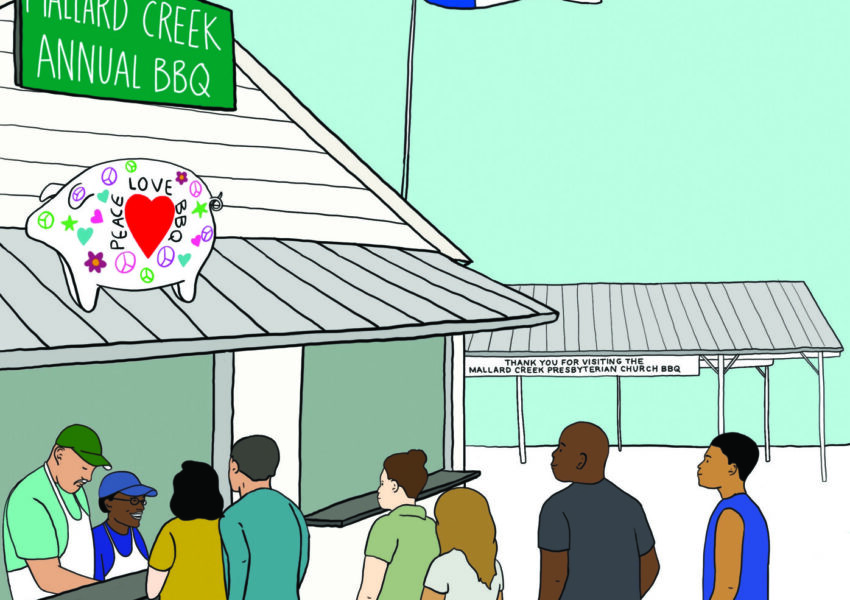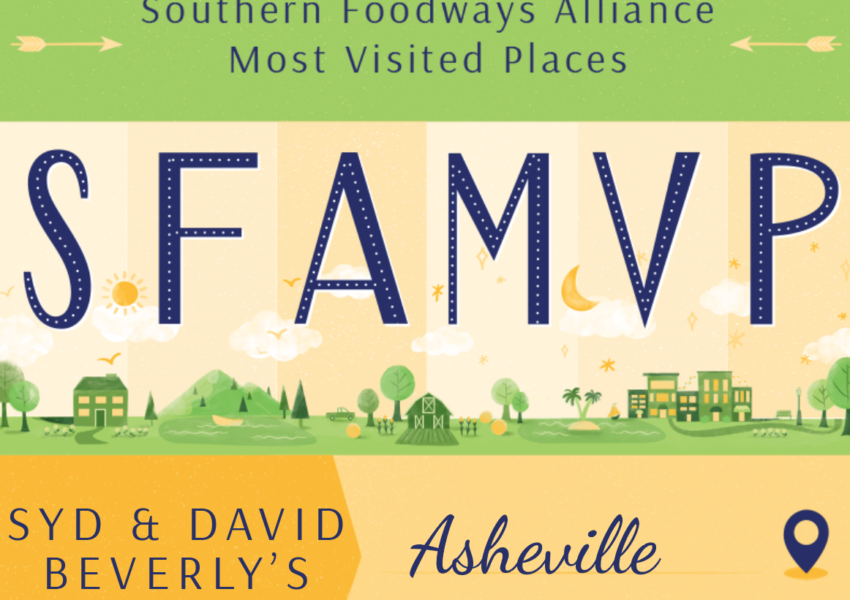Nourish and Flourish From cookouts to raised beds, Feed Durham NC works to end hunger.
by Katina Parker
Since April 2020, I’ve fed more than 50,000 people from my front yard through Feed Durham NC, a mutual aid collective I started at the beginning of the COVID-19 shutdown.
Every six to eight weeks, we gather on the one-acre corner lot where I live to cook tasty, nutrient-dense meals for upwards of 2,000 neighbors-in-need. Then we donate whatever we don’t cook to local organizers who distribute raw foods through their networks. We’ve served 15,000 meals and given away 35,000 pounds of veggies, fruit, and poultry. We nourish elders, widows, families living in cars and on the streets, those who are homebound or chronically ill, unsupported LGBTQ+ folks, undocumented families, elementary students, and their loved ones. We turn no one away.
Over the last eighteen months, Feed Durham NC has grown from two dozen volunteers to over 400. We are an all-weather crew that prepares food in a temporary outdoor kitchen with the use of 6 trailer smokers, 4 griddles, 10 burners, 3 washing stations, several socially-distanced tents for chopping produce, and a bedroom-sized refrigerator. Our youngest volunteers are a pair of five-year-olds who scrub root veggies with joyful abandon. Our eldest are veteran civil rights organizers well into their seventies.

Feed Durham NC is a Black-, Indigenous-, Queer-, and Trans-led, multiracial coalition. We are filmmakers, organizers, doulas, herbalists, students, educators, farmers, former restaurant workers, parents, and elders.
We insist on high-quality food and high-quality treatment for our most vulnerable neighbors. We understand that hunger is a tool of war and political manipulation. We recognize that eliminating hunger is the first and most critical step to creating a just world in which every child is positioned for healthy outcomes.
We know that we are only as safe, well, and joyful as our least hungry neighbor.
The rise of Feed Durham NC has been an overwhelming, all-consuming, heart-pounding, life-giving, spirit-healing, come full circle, come to fruition, up in the wee hours, pondering prayer of a blur.
We’ve churned out delicious cuisine during two hurricanes, violent lightning storms, profound heat, and bone-chilling cold—tents and tables blowing over while we plate for hungry neighbors; aggressive winds and unprecedented downpours; fingers so numb we have to slide hand warmers inside our gloves to keep chopping; waking up at 4 a.m. to put on the buffet pans we prepped just five hours earlier so vittles can heat, transform, cool and transfer into the fridge trailer by late morning before the temperature climbs to ninety-five degrees; daily runs to the grocery store to purchase dry ice that we pack next to raw chicken so fridge temps remain below thirty-seven degrees.
Somehow—through the steadiness of our commitment; through sheer will, one foot in front of the other; the generosity of beloveds and strangers; and innumerable thoughtful interventions initiated by our stewards (many of whom just happen to travel with circular saws and welding kits)—we pull it off.
We are only as safe, well, and joyful as our least hungry neighbor.
We load in on a Wednesday, rain or shine. Gigantic trucks and volunteers’ vehicles hustle in and out of my gravel drive, leaving behind dinosaur-sized cooking gear, thousands of pounds of produce, charcoal, propane. We spend all day assembling the production site, pulling our in-house supplies out of storage, washing everything down, putting shelves and forty-pound boxes of produce in the fridge trailer. One of our stewards jokes about offering Load-In Day as a CrossFit fundraiser.
Thursday, we start with a limited menu of chicken, rice, beans, and a green veg, cooking for the largest mission in North Carolina and making thirty plates which we hand-deliver to unhoused people. Friday, we prep meals for six to nine community partners who distribute individual and family pans door-to-door or on the street, and we add a few more veggie options to the menu.
By Saturday, dozens of volunteers purposefully move through the yard, on-task and happy to be a part of this thing we’re dreaming up as we go. Sunday, we make Gratitude Plates for volunteers, donors, and individual families we’ve agreed to help. We also pack grocery bags and break down the yard. Clean-up continues well into Monday, when several large trucks ramble up my gravel drive to collect all the rental equipment, and personal vehicles lumber in to receive grocery bags of uncooked produce and poultry.

Our typical menu is smoked chicken or turkey, herbed rice and beans, and seasonal vegetables—grilled, stewed, or smoked. All meals are gluten-free and nut-free. We offer dairy-free and vegetarian options. Favorites include our roasted beets tropicale (a recipe that intensifies sweetness without adding sugar, while neutralizing the taste of “clean dirt” that turns so many away from this magenta powerhouse); and braised butternut squash with agave, cinnamon, and coconut oil. For the chicken, we prepare an elaborate spiritual bath of spices, derived from an old family recipe, and then deep-smoke it overnight using hickory, pecan, maple or apple wood. Other menu items include spicy stewed cabbage, fire-roasted peppers and tomatoes, and seared eggplant. Each meal comes with a colorful, handwritten Love Note, often decorated by the children of volunteers.
My greatest gift has been witnessing volunteers who arrived uncertain and cautious, and watching them find their footing. They stretch their leadership, work their networks, and push themselves to learn new skills because they feel supported, validated, and wanted.

Caleb, Abigail, and Kailey keep me grounded and determined. They showed up in the first hours of our first cookout and have contributed to every cookout since. Abigail quickly mastered the griddling of cabbage, broccoli, and cauliflower. Kailey became expert at spicing and mashing 400 pounds of yams. Caleb has graduated to managing our chicken inventory and preparation. He set up a year-long donation with a local distributor who agreed to gift us three tons of poultry.
Every Friday that we cook, Caleb leads us in Shabbos, a guaranteed opportunity for everyone to express gratitude for who we are and what we’re forming together. Each of us, representing many faiths, acknowledge being on Catawba, Occoneechee, and Saponi land as we pray for the healing, safety, and strength of the people we feed.

Bella, a recent Duke grad and budding organizer, crowdfunds and recruits volunteers among her friends. Grayson, who once washed dishes for seven hours straight, now manages our bean and rice station. Jas, an emerging filmmaker, documents the drama of each barbecue—scheduling mishaps, inclement weather, mistakes, accidents, and outrageous personality types learning how to move as a cohesive body.
Through our residency program, dozens of organizers have traveled from Chicago, Baltimore, Richmond, Charlotte, and Atlanta to study with us so they can then scale the work for their capacities and communities.
Our partners include shelters and church programs. Individual volunteers leverage word-of-mouth networks to distribute meals to those who don’t qualify for “official” forms of support. Our stewards have felt the bittersweet discomfort of being thanked for food by a child who’s had to ration with siblings.
We raise about $10,000 to cover expenses for each cookout. Local businesses and nonprofits donate some of our food and cooking supplies. One day this summer, Durham-based Farmer Foodshare delivered 500 pounds of blueberries and 400 pounds of eggplant to my carport. The boxes and flats were gone within two hours. Our equipment vendors waive delivery fees. NC Green Heat has donated truckloads of cooking wood for our smokers. SpeeDeeQue, a copy shop, gives us thousands of sheets of cardstock printed with our logo so we can write Love Notes. Levin Jewish Community Center of Durham and 9th Street Bakery have gifted hundreds of bread loaves.

Over the past eighteen months, I’ve witnessed our Feed Durham volunteer family’s commitment intensify. I’ve worked alongside weary volunteers at midnight, sometimes later, loading smokers with chicken and fridges with tray after tray of “ugly” garlic corn, lightly charred broccoli, and savory rice set to go out the next day. I wait up, no matter how late, until I’ve heard that each volunteer made it home safely. And after each weekend we cook, I’ve struggled with the knowledge that the thousands of people we’ve fed will be hungry again soon.
As 2021 gives way to 2022, we’re shifting toward disrupting the root causes of hunger. This fall, we’ll launch a Neighborhood Service Corps Initiative, through which everyday folks who have time and skill sets will install raised garden beds and grow food in collaboration with neighbors-in-need. We’re working to foster a culture of thoughtful giving that shifts unused or dormant resources from middle-class and wealthy communities to under-resourced ones. We’re engaging children to understand and organize against hunger. Through a masterclass video series, we’re teaching culturally relevant recipes and meal-preparation techniques to the communities we serve. And we are sharing our organizing blueprints so that we can sustain hundreds of thousands of people across the United States. We have the wherewithal and the resources to make life more livable for all the people who are stressed and struggling, in Durham and beyond. I’m leaning into possibility because it keeps me going, and keeps the folks around me going, too.
Katina Parker is a filmmaker, photographer, writer, and the founder of Feed Durham NC.
SIGN UP FOR THE DIGEST TO RECEIVE GRAVY IN YOUR INBOX.




